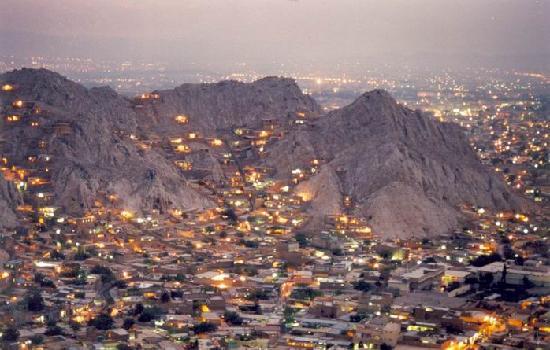

Quaid-E-Azam Residency:
Quaid-e-Azam residency with its lush green lawns, chinar trees and flower gardens commands a striking view of the whole valley.
It is of historical importance, as the Quaid-e-Azam Muhammad Ali Jinnah, the Founder of Pakistan, stayed there during his last illness.
It houses the relics of the Father of the Nation.
The Residency was built in 1882 by the British and used by the Agent to the Governor General as his summer headquarters.

Hazarganji Chiltan National Park:
In the Hazarganji Chiltan National Park, 20 kilometers South-West of Quetta, Maarkhors have been given protection.
The park is spread over 32,500 acres, altitude ranging from 2021 to 3264 meters. Hazarganji literally means "of a thousand treasures".
In the folds of these mountains, legend has it, that, there are over a thousand treasures buried, reminders of the passage of great
armies down the corridors of history. The Bactrains, Scythians, Mongols and then the great migrating hordes of Baloch all passed this way.

Hanna Lake:
A little short of the place where the Urak Valley begins and 10 kilometers from Quetta is the Hanna Lake, where suitable rest
rooms and pavilions on terraces have been provided. Golden fish in the lake comes swimming right upto the edge of the lake.
A little distance away, the waters of the lake take on a greenish blue tint. Right where the water ends, have been planted pine
trees on the grass filled slopes. The greenish-blue waters of the lake provide a rich contrast to the sandy brown of the hills in the
background. One can promenade on the terraces. Wagon service operates from city bus station at Circular Road.
The transport can be hired through the Pakistan Tourism Development Corporation (PTDC) Tourist Information Centre, Muslim Hotel,
Jinnah Road Quetta.

Quetta International Airport:
Quetta International Airport is located at Quetta, the provincial capital of Balochistan, Pakistan.
The airport is the fourth highest airport in Pakistan (1605 metres above sea level). It is second largest airport in the south region of
the country and the largest for the province of Balochistan. It is situated 12 km south-west of the city spread over an area of 35 acres
(14 ha). Average scheduled flights were 1332, non-scheduled flights 247, and the total recorded passenger flow was 152,698 in 2007.

Bolān Pass:
The Bolān Pass is a mountain pass through the Toba Kakar Range of Balochistan province in western Pakistan,
120 kilometres from the Afghanistan border. It connects Sibi with Quetta both by road and railway. The pass itself is made up of a
number of narrow gorges and stretches 89 km (55 miles) from Rindli north to Darwaza near Kolpur in the Balochistan province of Pakistan
